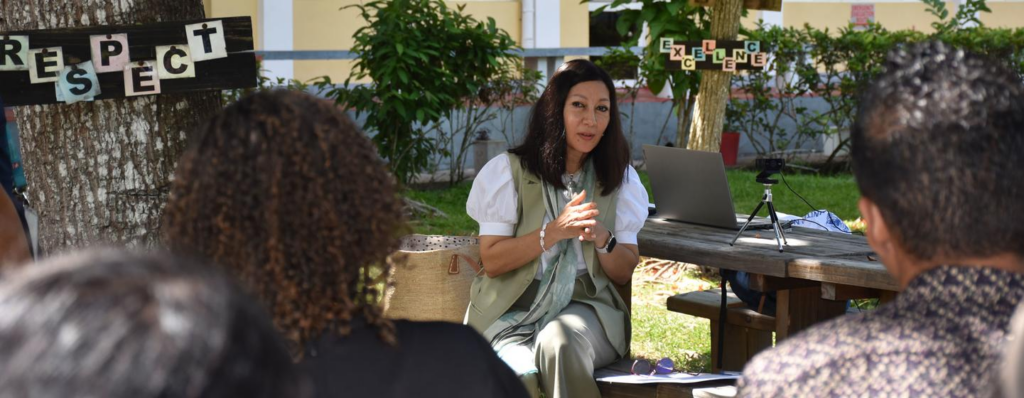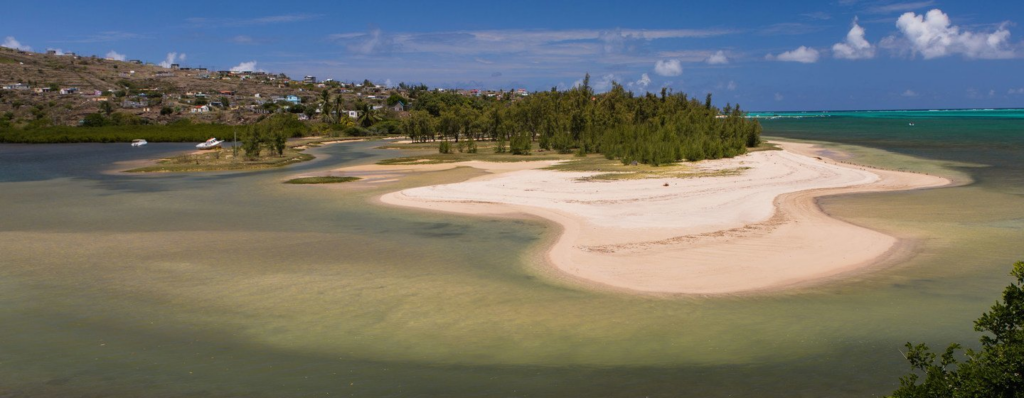
New York, USA, 26 July 2023-/African Media Agency(AMA)/-Transforming the way food is produced on the Indian Ocean archipelago of Mauritius could help to fight climate change as well as accelerate progress towards the Sustainable Development Goals (SDGs), according to the UN’s most senior representative in the country.
Lisa Singh, who is the UN Resident Coordinator in Mauritius and Seychelles, was speaking ahead of the UN Food Systems Summit +2 which is taking place in Italy from 24 to 26 July.
“This is a particularly compelling time to be the Resident Coordinator for a small island state like Mauritius. Since my arrival here in 2022, I have experienced examples of extreme weather conditions such as flooding and cyclones on the one hand and water shortages on the other.
This visible effect of climate change combined with our geographical remoteness, small scale of economies, and high import costs have grave consequences for our island’s food security. It has gained greater momentum since the COVID-19 pandemic and Ukraine war-related supply and commodity shocks, raising strong preoccupations with food security as a key to the sustainable economic transformation agenda.

Food systems have emerged not only as an agricultural challenge but as a game-changer to catalyse results across multiple SDGs. The upcoming event in Italy provides an opportunity for Mauritius to focus on the way forward to accelerate the transformative power of food systems.
Food production must be viewed across sectors and not in isolation. Water and energy are direct inputs at all stages of the food value chain, while natural resources, ecosystems, and their services underpin the security of these inputs. Agriculture accounts for 30 per cent of water use in Mauritius alone. Globally, one third of the world’s available energy is consumed by the food production value chain.
Taking holisitic approach
Addressing water scarcity and investing in renewable energy is critical to food security. Mauritius imports three quarters of its energy with renewable energy, accounting for 24 per cent of its current energy mix. It imports over 77 per cent of its food requirements with households under strain as food prices on staple goods such as bread, black lentils, powdered milk, and cooking oil continue to rise. Our reliance on imports such as seeds, fertilizers, pesticides, technology, and equipment leave it vulnerable to worldwide commodity and supply disruptions.
Transforming food systems can play a key role in countries’ climate change mitigation and adaptation strategies. For instance, in line with its nationally determined contributions, Mauritius has re-affirmed its commitments to reduce greenhouse gas emissions from the agricultural sector. The country has also identified agriculture as a priority sector for climate change adaptation with much focus on efficient irrigation techniques and climate-smart agriculture.
Clearly for the UN team, supporting a holistic systems approach to address the interlinkages between food, climate, water, energy, and gender is critical.
Power of partnerships
We are taking a dual focus. There is the institutional engagement to inform the strategies, policies, and budgets necessary to transform food systems as well as influencing budget allocations.
We also aim at strengthening community resilience, leveraging the power of partnerships, digital platforms, private-public modalities, and data, with the inclusion of women and youth at the centre.
For countries like Mauritius, where tourism is a significant source of GDP earnings, the impact of climate change poses a sustainability risk given its rare yet fragile natural ecosystems.
Lives and livelihoods of communities, particularly in coastal areas, are directly impacted. Coral bleaching and human pollution is putting pressure on the lagoon ecosystem affecting our artisanal fishers like Nazma and her family.
She has been an artisanal fisher for over 30 years along with her husband and several of her children. This is a sustainable way of fishing, as only lines are used unlike in commercial fishing. Furthermore, most of the fish caught by them are for consumption in Mauritius as opposed to export.
Nazma says that she loves everything about fishing. It is a passion that has become her job. But, she emphasizes that life is expensive, fuel is expensive, and there are fewer fish in the lagoon.
The UN, in collaboration with the European Union through the Ecofish project, is using innovations in technology to empower artisanal fishers to move out of over-exploited lagoons.
Nurturing ‘smart’ agriculture
By improving the economic resilience of these traditional fisher communities, food security will be strengthened through better-managed marine resources.
In Rodrigues, which is part of the archipelago of Mauritius, we are working with eight women who have formed the Rodrigues Turmeric Producers Association to grow and process turmeric into powder for sale.
Addressing the energy inputs into agriculture, one of the association members, Marie-Anne, says that with financial backing from the Small Grants Programme (SGP) of the UN-supported Global Environment Facility (GEF), she and her peers were able to buy a solar dryer to replace an electric one that consumed a lot of energy and cost a lot of money.

Her colleague and friend, Perrine, explains how the business allows women to emancipate themselves. It will also enable their grandchildren to continue this work because turmeric will always be there.
There are other innovative sustainable food systems solutions being piloted by UN agencies in Mauritius. The UN Development Programme (UNDP), together with the Food and Agriculture Organization (FAO) and UN Women under the Joint SDG Fund, are promoting low-cost biofertilizers made locally from seaweed.
Initiatives to nurture smart agriculture are being supported by FAO, UNDP, the UN Conference on Trade and Development (UNCTAD), and the UN Population Fund (UNFPA).
With only seven years left to deliver on the 2030 Agenda our UN Country Team in Mauritius will continue its efforts to support the diversification of the economy, strengthen the circular economy, and invest in human capital to combat supply shocks.
Working in partnership to further climate action and foster resilient pathways is key to protecting the future of Mauritius for our people, planet, prosperity, and peace.”
Distributed by African Media Agency (AMA) on behalf of UN NEWS
The post Transformative power of food production in Mauritius: A UN Resident Coordinator blog appeared first on African Media Agency.





